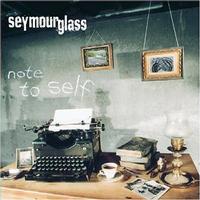In J.D. Salinger's story a "A Perfect Day for Banana Fish," the main character Seymour Glass, a World War II veteran stressed by amending to normal lifestyle, fired an Ortgies pistol and released a bullet from the magazine into his temple.
The band sharing the same name as the character is risking a similar fate with the dynamic musicianship the four Staten Island men have taken a forte to. Note To Self is the debut record from both the band and MTV's poster boy Carson Daly's new-found label, 456 Entertainment. Seymour Glass' sound can not easily be classified into one definite genre. Indie would be the prominent description, but what does that mean anyways? Post-hardcore with the sizeable sound of orchestrated rock ân roll and acceptance of alternative pop-rock with a jazzy touch is an clarification that no one can accurately interpret let alone fathom what it sounds akin to.
An immense drum beat introduces the musically mellow and unpredictable "Hypervent" pooled with airy vocals this Sparta-like number fails to harness the potential it possesses. "Trigger Finger" encompasses a jazz sense with pianist James Federico's beautiful talent, the bass line strikes like an urban rhythm and the entrance of a commercially acceptable chorus allows for the group to strikingly pull off an admirable effort. The title and musical struggle behind "Car Crash" resembles a mediocre version of Thursday's endeavor "Understanding In A Car Crash."
Seymour Glass is filled with three very talented musicians who are able to perform on the outskirts of a wide musical spectrum. Federico's finger play on the piano is a significant mark on the group and brings to life a unique sound. Not all members are equally as strong, vocalist Artie Kitchen's haunting singing draws resemblances to more laid back versions of Thom Yorke (Radiohead) and Jim Ward (Sparta), lacking the ability to be as compelling and truly capture the audience.
While potential bellows from the majority of the thirteen tracks the tail end of the album fails to bind the abilities I praised earlier. "Broken," "A Drive By" and "Hurricane," which flow 9-11, are practically indistinguishable, gentle piano lead songs with supple drum beats that spill into each other too seamlessly. It takes nearly three minutes into "Abrasion Uncommon" before they can save face with one last worthy track before "Everytime" concludes the record with mixed vigor.
Note to Self leaves me feeling how Seymour's wife, Muriel Glass, must have felt when she found out about her husband's suicide: empty. The aptitude and impending success are laid out; the group simply needs to tie together a few loose ends, not stumble into a suicidal path and assertively use their existing talent.
